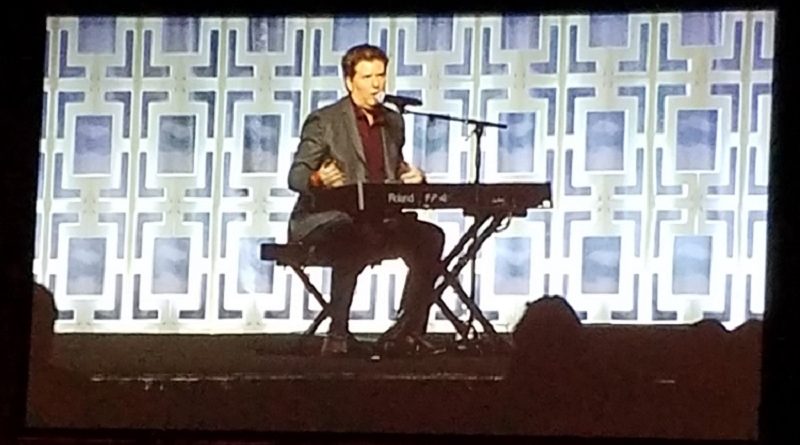Star Wars Celebration Orlando 2017: The Music of Rogue One with David Collins
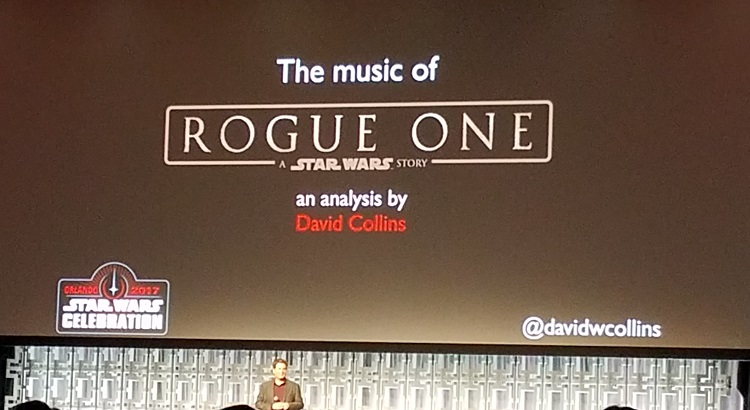 While the high-profile panels at Celebration tend to garner the most attention before, during, and after the convention, sometimes you learn the most from the less prominent ones. Matt Stover’s writing seminar at Celebration III and Dave Filoni’s storytelling seminar at Celebration VI, for example, held lessons that still influence both Tricia and me. Each Celebration offers up at least one of the sleeper hits, and Orlando was no exception.
While the high-profile panels at Celebration tend to garner the most attention before, during, and after the convention, sometimes you learn the most from the less prominent ones. Matt Stover’s writing seminar at Celebration III and Dave Filoni’s storytelling seminar at Celebration VI, for example, held lessons that still influence both Tricia and me. Each Celebration offers up at least one of the sleeper hits, and Orlando was no exception.
On Thursday afternoon, after the thrill of the Fortieth Anniversary panel had eased and before the next morning’s rush of excitement for The Last Jedi, David Collins’ panel on “The Music of Rogue One” turned out to be about a lot more than the notes on the pages and the performance of the musicians and their instruments. Instead, the overarching subject of Collins’ presentation was storytelling, with music as yet another lens to approach the analysis.
Collins began with the concept of the “composer’s conundrum,” tracing the dilemma back to the post-Beethoven era of classical music. After such greatness, how could any composer hope to make a meaningful contribution? The solution, of course, is not to try to match or surpass the master, but rather to coexist by learning from and building upon that legacy while offering something new in addition. Jump ahead on the timeline about two centuries, and Michael Giacchino faced a not-so-different situation: the daunting task of writing the first Star Wars theatrical score not composed by the legendary John Williams. Giacchino had to find his own way to resolve the conundrum, honoring Williams’ spectacular foundation while still writing music in his own voice.
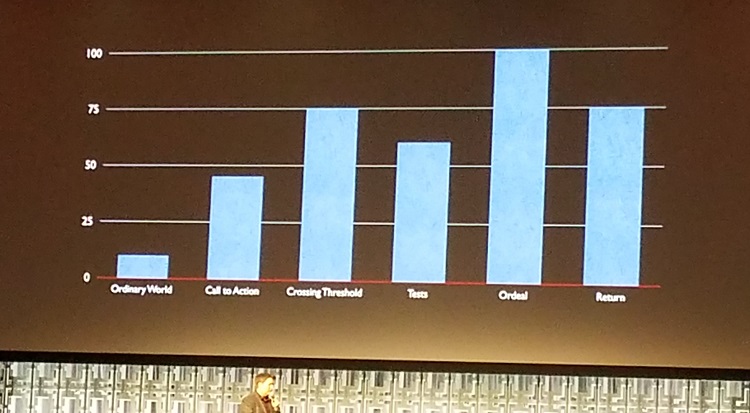 Before explaining some of the ways that Giacchino succeeded in this endeavor, Collins revisited the iconic “Main Theme” that has opened every saga film. Going back to the 1977 soundtrack liner notes, this theme is also identified as “Luke’s Theme.” In the Original Trilogy, Luke is the central protagonist undertaking a Hero’s Journey using the monomyth framework synthesized by Joseph Campbell that heavily influenced George Lucas’ approach. Using a graphical representation of the peril and stakes of the key stages of the Hero’s Journey, then comparing its structure to the melodic shape of the “Main Theme,” Collins made a profound point about why Williams’ work is so fundamental to our understanding of Star Wars: “Luke’s Theme” is not only the hero’s melody, but a musical representation of the Hero’s Journey itself. No doubt for most fans the impact of this parallel is subconscious, but seeing it visually depicted at the panel certainly made an impact on the audience.
Before explaining some of the ways that Giacchino succeeded in this endeavor, Collins revisited the iconic “Main Theme” that has opened every saga film. Going back to the 1977 soundtrack liner notes, this theme is also identified as “Luke’s Theme.” In the Original Trilogy, Luke is the central protagonist undertaking a Hero’s Journey using the monomyth framework synthesized by Joseph Campbell that heavily influenced George Lucas’ approach. Using a graphical representation of the peril and stakes of the key stages of the Hero’s Journey, then comparing its structure to the melodic shape of the “Main Theme,” Collins made a profound point about why Williams’ work is so fundamental to our understanding of Star Wars: “Luke’s Theme” is not only the hero’s melody, but a musical representation of the Hero’s Journey itself. No doubt for most fans the impact of this parallel is subconscious, but seeing it visually depicted at the panel certainly made an impact on the audience.
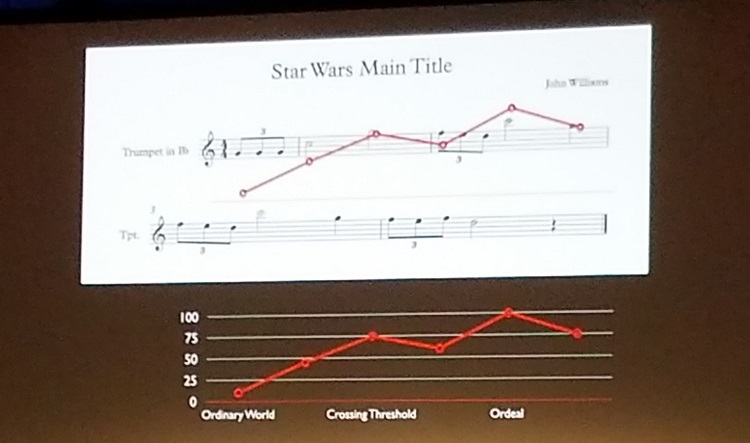 Collins then explained why this setup was important: because unlike A New Hope or the Original Trilogy as a whole, Rogue One is not a Hero’s Journey in the traditional sense. While Jyn may be the main character, Collins views the story of Rogue One as ensemble heroism – and its story arc not so much as a Campbellian progression toward an individual’s heroism but rather as a precursor story, the successful fulfillment of a Rebellion mission that makes Luke’s Hero’s Journey adventure possible. For Collins, then, this explains why Giacchino’s “Hope Theme” for Rogue One has echoes of the “Main Theme,” but only that. Unlike Luke’s path to heroism, the melody for Rogue One’s heroes cannot musically resolve into the triumphant major chords that the “Main Theme” provides. What the “Hope Theme” tells the audience, musically, is that within Rogue One hope doesn’t last long, and considerable sacrifice will be necessary to achieve victory. Collins illustrated this storytelling point with several clips from the movie, showing how the music reinforces the thematic moments faced by the characters.
Collins then explained why this setup was important: because unlike A New Hope or the Original Trilogy as a whole, Rogue One is not a Hero’s Journey in the traditional sense. While Jyn may be the main character, Collins views the story of Rogue One as ensemble heroism – and its story arc not so much as a Campbellian progression toward an individual’s heroism but rather as a precursor story, the successful fulfillment of a Rebellion mission that makes Luke’s Hero’s Journey adventure possible. For Collins, then, this explains why Giacchino’s “Hope Theme” for Rogue One has echoes of the “Main Theme,” but only that. Unlike Luke’s path to heroism, the melody for Rogue One’s heroes cannot musically resolve into the triumphant major chords that the “Main Theme” provides. What the “Hope Theme” tells the audience, musically, is that within Rogue One hope doesn’t last long, and considerable sacrifice will be necessary to achieve victory. Collins illustrated this storytelling point with several clips from the movie, showing how the music reinforces the thematic moments faced by the characters.
Although the “Hope Theme” may be one of the more memorable melodies from Rogue One – it is, after all, the soaring music that swells over the title card after the prologue, where normally the “Main Theme” blasts in a saga film – Collins emphasized that the most frequently used theme in Giacchino’s score is a shorter and more subtle musical cue. Called “Dies Irae,” the four-note theme originates in a thirteenth century Latin hymn for the dead. Among the composers of the Romantic period following Beethoven, quoting “Dies Irae” served to symbolize death or dread. Contemporary film scores now frequently do the same; Collins noted that John Williams uses “Dies Irae” in the score for A New Hope, such as a brief quoting of the theme when Ben Kenobi, perhaps sensing a portent in the Force as he urges Luke to come with him to Alderaan and help the Princess, admits he’s getting too old for a life of adventure.
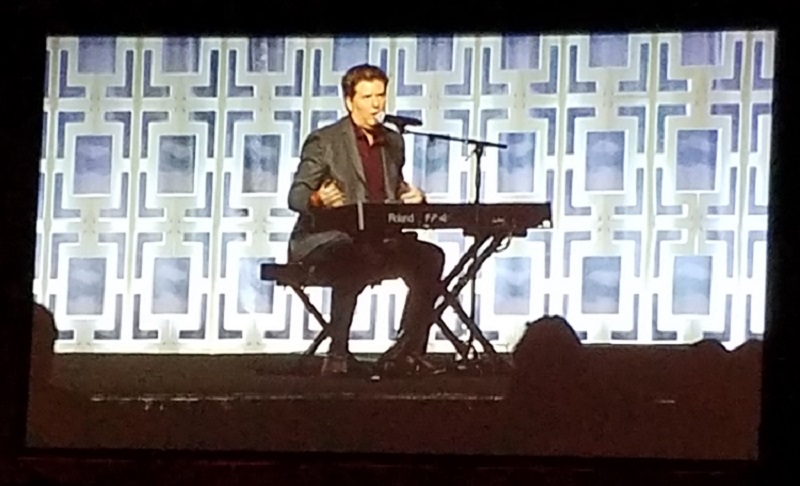 Both at the piano and with clips from the film, Collins explored the numerous ways “Dies Irae” appears in Giacchino’s score for Rogue One. “Dies Irae” appears three separate times within “Jyn’s Theme,” and its intervals are what gives her theme a sense of familiarity to other Star Wars themes like “Across the Stars” and the “Force Theme.” In writing for the principal adversary of the film, Giancchio reverses the opening intervals of “Jyn’s Theme” to form the opening of “Krennic’s Theme,” musically mirroring their opposing paths in the film. “Dies Irae” also influences the “Guardians of the Whills Theme,” though it does not quite resolve into its full form when associated with Chirrut. For perhaps the most direct and impactful use of “Dies Irae” in the Rogue One score, queue up the scene when Jyn and Cassian are climbing inside the data vault toward the Stardust datafile. As the scene cuts away to Krennic and his pair of Death Troopers, “Dies Irae” rises in the score. Both literally and musically, death is chasing the heroes as they desperately seek to steal the Death Star plans. When the scene cuts back to Jyn and Cassian, the “Hope Theme” celebrates their success at retrieving the datafile – only to return to “Dies Irae” as the door opens and they face Imperial blasterfire in their attempt to escape upward toward the transmission array.
Both at the piano and with clips from the film, Collins explored the numerous ways “Dies Irae” appears in Giacchino’s score for Rogue One. “Dies Irae” appears three separate times within “Jyn’s Theme,” and its intervals are what gives her theme a sense of familiarity to other Star Wars themes like “Across the Stars” and the “Force Theme.” In writing for the principal adversary of the film, Giancchio reverses the opening intervals of “Jyn’s Theme” to form the opening of “Krennic’s Theme,” musically mirroring their opposing paths in the film. “Dies Irae” also influences the “Guardians of the Whills Theme,” though it does not quite resolve into its full form when associated with Chirrut. For perhaps the most direct and impactful use of “Dies Irae” in the Rogue One score, queue up the scene when Jyn and Cassian are climbing inside the data vault toward the Stardust datafile. As the scene cuts away to Krennic and his pair of Death Troopers, “Dies Irae” rises in the score. Both literally and musically, death is chasing the heroes as they desperately seek to steal the Death Star plans. When the scene cuts back to Jyn and Cassian, the “Hope Theme” celebrates their success at retrieving the datafile – only to return to “Dies Irae” as the door opens and they face Imperial blasterfire in their attempt to escape upward toward the transmission array.
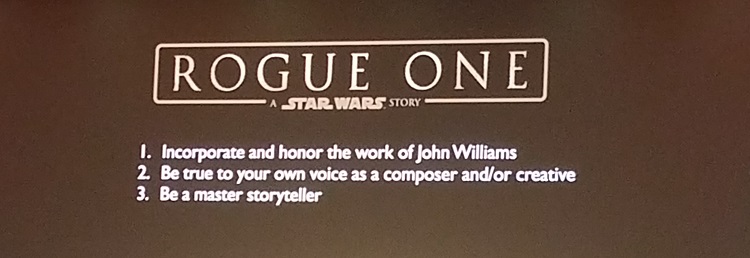 Collins concluded his presentation by speaking briefly about Giacchino’s other work as a composer, projects as varied as The Incredibles, Up, Star Trek, and Zootopia in film and Alias and Lost on television. While John Williams is primarily a composer neoclassical style, Collins described Giacchino as having a more emotional style, comparing his music to the ancient Greek chorus commenting on the action in the story rather than simply accompanying it. Although much of the story of Rogue One is dark, and the music follows accordingly, Collins noted that in the climactic sequences at the end – two Star Destroyers colliding to destroy the shield gate, the successful transmission of the plan to the Rebel flagship, the arrival of the Death Star above Scarif, the fateful superlaser blastwave consuming Jyn and Cassian, even the arrival of Vader’s Star Destroyer and his approach to the crippled Profundity – the music is often light and gentle rather than bombastic and heroic, yet given the thematic power of a major key to indicate the hope provided by the success of Jyn and her team.
Collins concluded his presentation by speaking briefly about Giacchino’s other work as a composer, projects as varied as The Incredibles, Up, Star Trek, and Zootopia in film and Alias and Lost on television. While John Williams is primarily a composer neoclassical style, Collins described Giacchino as having a more emotional style, comparing his music to the ancient Greek chorus commenting on the action in the story rather than simply accompanying it. Although much of the story of Rogue One is dark, and the music follows accordingly, Collins noted that in the climactic sequences at the end – two Star Destroyers colliding to destroy the shield gate, the successful transmission of the plan to the Rebel flagship, the arrival of the Death Star above Scarif, the fateful superlaser blastwave consuming Jyn and Cassian, even the arrival of Vader’s Star Destroyer and his approach to the crippled Profundity – the music is often light and gentle rather than bombastic and heroic, yet given the thematic power of a major key to indicate the hope provided by the success of Jyn and her team.
If you don’t already, be sure to follow David Collins on Twitter @DavidWCollins. He did a great interview with Fangirls Going Rogue in September, and talked to Skywalking Through Neverland in December about his voice acting roles in Rogue One.

